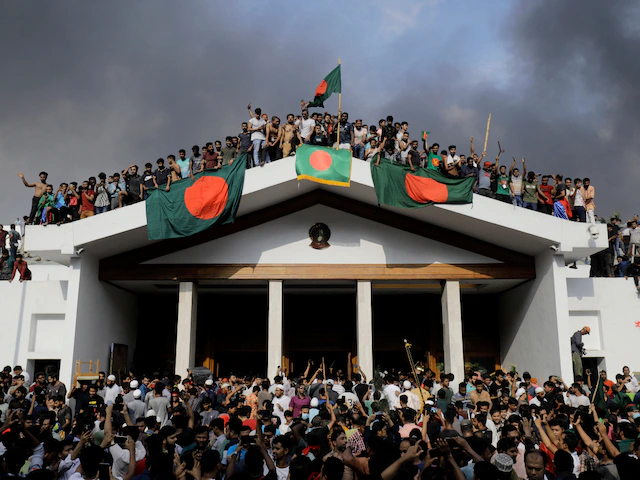On August 5, 2024, Bangladesh witnessed a dramatic shift in its political landscape as former Prime Minister Sheikh Hasina was ousted in a military coup. This event marked a pivotal moment not only for Bangladesh but also for its neighbouring country, India. Hasina, a key political figure in Bangladesh for the last two decades, landed in India at Hindon Air Force base fleeing her country. The coup, led by a faction within the military, was swift and decisive, plunging the country into uncertainty led by an interim government.
The Bangladeshi crisis is not an isolated event but rather the latest in a series of political upheavals that have rocked South Asia in recent years. The recent turmoil in Bangladesh is another example of how political instability has become a recurring theme across the subcontinent, each event feeding into the next, creating a volatile environment threatening the region’s peace and stability and leaving behind lessons of Do’s and Don’ts for countries.

The Wave of Political Turmoil in South Asia

Myanmar’s Military Coup: On February 1, 2021, Myanmar’s military, known as the Tatmadaw, seized power, overthrowing the democratically elected government of Aung San Suu Kyi. The coup, justified by the military as a response to alleged electoral fraud, sparked massive protests and a brutal crackdown that led to thousands of deaths and displacements. The military’s grip on power has only tightened since, leading to a prolonged civil conflict that has destabilized not just Myanmar but also its neighbours, with refugees spilling across borders and armed resistance movements gaining strength.

Taliban Takeover in Afghanistan: The chaotic withdrawal of U.S. and NATO forces from Afghanistan in August 2021 paved the way for the Taliban to retake control of the country. The fall of Kabul marked a dramatic end to two decades of U.S.-led efforts to establish a stable government. The Taliban’s return to power has plunged Afghanistan back into a state of fear and uncertainty, with human rights, especially women’s rights, severely curtailed. The impact of the Taliban’s rule has been felt across South Asia, with concerns about the resurgence of terrorism, increased drug trafficking, and the humanitarian crisis spilling over into neighbouring countries.

Ouster of Imran Khan in Pakistan: In April 2022, Pakistan’s Prime Minister Imran Khan was ousted through a no-confidence vote, marking the first time in the country’s history that a sitting prime minister was removed by parliamentary means. Khan’s ouster triggered widespread protests and political unrest, as his supporters accused foreign powers and internal rivals of orchestrating his downfall. The political instability has persisted, with Pakistan grappling with economic challenges, rising inflation, and a fragmented political landscape that has hindered effective governance.

Protests and Political Collapse in Sri Lanka: Sri Lanka’s economic crisis reached a boiling point in 2022, leading to unprecedented protests that forced President Gotabaya Rajapaksa to flee the country. The crisis was fueled by years of economic mismanagement, compounded by the pandemic and a crippling debt burden. As the country ran out of foreign reserves, Sri Lankans faced severe shortages of essential goods, leading to mass demonstrations. The political collapse in Sri Lanka has left the country in a state of uncertainty, with a fragile government struggling to restore order and economic stability.
Rapid Government Changes in Nepal: Nepal’s political scene in 2023 was marked by frequent changes in government, reflecting deep-rooted instability and factionalism. The country’s political parties have struggled to maintain cohesive coalitions, resulting in a series of rapid changes in leadership. This instability has been exacerbated by internal divisions over federalism, ethnic representation, and foreign policy alignments, with both India and China vying for influence in Nepal’s political affairs.
Maldives Elections and the India Out Campaign: The 2024 elections in the Maldives saw Mohamed Muizzu rise to power, amid a contentious political environment dominated by the “India Out” campaign. This campaign, which called for reducing Indian influence in the Maldives, highlighted the growing geopolitical tensions in the region. Muizzu’s victory signalled a potential shift in the Maldives’ foreign policy, with possible repercussions for India’s strategic interests in the Indian Ocean. The election also reflected the broader challenges facing South Asia, where external powers are increasingly involved in shaping domestic politics.
Current Implications of the Bangladesh Crisis for India
The crisis in Bangladesh is of particular concern to India, given the close geographical, historical, and cultural ties between the two nations. With Nobel Laureate Mohammad Yunus as the leader, an interim government has been sworn in, comprising a wide range of figures, from young student activists to career diplomats, with some representation for women and minority groups. Although the interim government has expressed a desire to maintain strong bilateral relations, Sheikh Hasina’s extended stay in India has the potential to complicate matters. A key adviser of Bangladesh’s interim government on Monday (August 11, 2024) stated that Hasina’s presence in India would not harm bilateral relations and that Dhaka would strive to maintain good relations with New Delhi.
However, the instability in Bangladesh poses several risks, including the potential for increased attempts at cross-border migration, security threats from extremist groups, and disruptions to regional trade and development initiatives. India’s northeastern states, which share a long and porous border with Bangladesh, are particularly vulnerable to the spillover effects of the crisis. The unfolding situation in Bangladesh serves as a stark reminder of the fragile political environment in South Asia and the need for proactive engagement to address the root causes of instability. But as countries re-configure their stance on this power shift, it’s certainly true what Alfred Thayer Mahan stated – “Whoever rules the waves, rules the World.”

